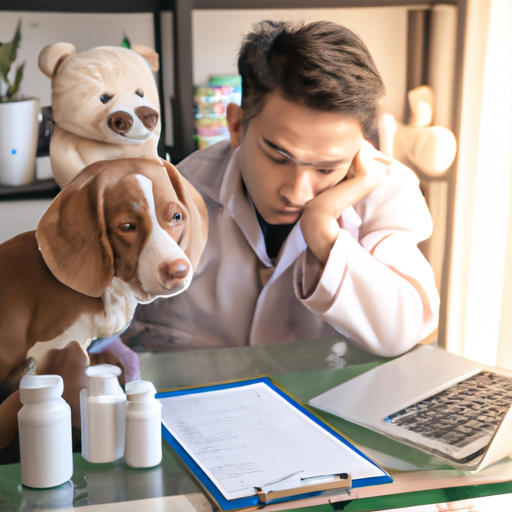As a caregiver, you need to understand the nature of ulcers and how you can help your four-legged friend lead a pain-free life.
H2: Understanding Ulcers in Dogs
Ulcers are wounds that occur in the stomach or the upper part of the small intestine. Dogs, like humans, can suffer from these painful sores. Ulcers can be a symptom of another illness or can be caused by certain medications.
Causes
Ulcers in dogs can be caused by:
- Prolonged use of non-steroidal anti-inflammatory drugs (NSAIDs)
- Ingestion of foreign materials like plastic or metal
- Liver disease
- Kidney failure
- Stress
H2: Symptoms of Ulcers in Dogs
If your dog is suffering from an ulcer, you may notice the following symptoms:
- Vomiting (sometimes with blood)
- Loss of appetite and weight loss
- Anemia
- Weakness and lethargy
H2: Diagnosis of Ulcers in Dogs
If you suspect your dog may have an ulcer, take your dog to the vet immediately. Your vet will perform a physical examination and may order the following tests:
| Test | Description |
|---|---|
| Endoscopy | A small camera is used to view the stomach and small intestine |
| Blood Tests | To check for anemia and evaluate liver and kidney function |
| X-Ray | To look for foreign bodies or tumors |
H2: Treating Ulcers in Dogs
Treatment of ulcers in dogs depends on the cause. If the ulcer is due to a foreign body, surgery may be required. For ulcers caused by NSAIDs, your vet may switch your dog’s medication and prescribe a drug to protect the stomach lining.
Here are some steps you can take to help your dog recover:
- Follow your vet’s instructions carefully. This may involve giving medication, changing diet, or managing underlying conditions.
- Maintain a stress-free environment for your dog to help speed up recovery.
- Monitor your dog closely for any changes in symptoms.
H2: Preventing Ulcers in Dogs
Prevention is better than cure. Here are some tips to help prevent ulcers in your dog:
- Avoid giving your dog NSAIDs unless prescribed by a vet.
- Keep foreign objects out of your dog’s reach.
- Regular vet check-ups can help detect early signs of liver disease or kidney failure.
FAQs
Q: Can ulcers kill dogs?
A: If left untreated, ulcers can lead to life-threatening complications such as perforation and bleeding.
Q: How long does it take for an ulcer to heal in dogs?
A: With appropriate treatment, most ulcers in dogs start to heal within 7-10 days.
Q: Can I give my dog human ulcer medication?
A: Never give your dog any medication without consulting your vet. What works for humans may not work for dogs and can even be harmful.
Q: Are certain breeds more prone to ulcers?
A: No specific breed is more prone to ulcers. However, older dogs and dogs with chronic diseases are at higher risk.
Remember, early detection and treatment are key to helping your dog recover from an ulcer. If you notice any signs of distress in your dog, seek veterinary care immediately. Your vigilance can make all the difference in the world to your dog’s health and well-being.



